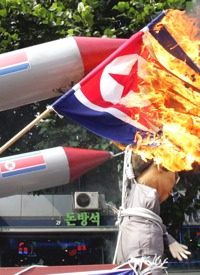
The Pyongyang regime has previously announced that it plans to place a communications satellite into orbit between April 4 and 8, but the U.S. military is more concerned about the missile itself than the satellite payload. South Korean, Japanese, and the U.S. officials have said there is no difference between a satellite launch and a test launch of the Taepodong-2 missile. North Korea’s last launch of the missile in 2006 lasted less than a minute before blowing apart. U.S. scientists believe that the missile, once perfected, will be capable of striking Alaska or Hawaii — and eventually — the west coast of the United States.
Reuters news quoted a U.S. official who commented on a meeting between President Barack Obama and South Korean President Lee Myung-bak on the sidelines of the G-20 financial summit in London. The official, who was unnamed, said that the two leaders agreed the missile launch will violate UN Security Council resolutions. The resolutions were reached after the failed Taepodong-2 test launch in July 2006 and its detonation of a nuclear device on October 9 of that year. They bar North Korea from ballistic missile testing as well as most of its weapons trading. Army General Walter Sharp, the head of U.S. forces in Korea, told the Senate Armed Services Committee on March 19 that North Korea is the world’s top supplier of ballistic-missile technology to nations unfriendly to the U.S., such as Iran and Syria.
“We have been making maximum efforts to try to dissuade them and still hope that they may change their minds,” said the official.
President Obama told a group of reporters before the April 2 meeting that South Korea is “one of America’s closest allies and greatest friends.” He thanked President Lee for his country’s “outstanding contribution” in Afghanistan. Bloomberg news reported that Obama did not respond to a question shouted by a reporter about a possible missile launch.
A statement issued by South Korea’s presidential office said that Obama and Lee had agreed to pursue a verifiable dismantling of North Korea’s nuclear programs.
The statement added that the two leaders had agreed on the need “for a stern, united response from the international community” and to work together to make that happen.
Japan, fearing that falling debris from the launch — such as spent booster stages — might threaten Japanese territory, has dispatched ships armed with missile-intercepting rockets under the missile’s projected path and has indicated it is prepared to intercept missile parts it considers dangerous.
In response, North Korea’s official KCNA news agency has issued strongly worded statements warning against any interference: “If Japan recklessly ‘intercepts’ the DPRK’s (Democratic People’s Republic of Korea’s) satellite for peaceful purposes, the [North] Korean People’s Army will mercilessly deal deadly blows not only at the already deployed intercepting means but at major targets,” KCNA quoted a military spokesman. The spokesman promised a “thunderbolt of revenge.”
Since Japan has never threatened to harm the satellite, itself, but only to eliminate any falling debris, the statement may be viewed as saber-rattling rhetoric.
As North Korea’s tone escalates, however, several points are worth considering:
- The government based in Pyongyang, like all communist regimes, cannot be counted on to behave as a peace-loving member of the world family of nations.
- That government has a history of provoking international incidents, and the United States has a parallel history of reacting very weakly to those provocations. The most outstanding example of this is probably the January 1968 capture of the USS Pueblo by North Korean ships and the subsequent detainment of the crew for almost a year.
- Ever since the Korean War, that ended in a stalemate with the communists in control of the North, the United States has allowed its own interests to be subjugated by the UN.
- Once again, as with our initial rationale for invading Iraq, our president (and the president of South Korea) have based their condemnation of North Korea not solely on that nation’s behavior, but on its violation of a UN resolution. Recall that in October 2002, both houses of Congress complied with President Bush’s request for authorization to invade Iraq by overwhelmingly approving House Joint Resolution 114, authorizing the president to “enforce all relevant United Nations Security Council resolutions regarding Iraq.”
While any aggressive actions taken by a rogue communist state like North Korea should unquestionably be dealt with from a position of strength, that strength should emanate from our own military preparedness and a firm foreign policy designed to protect U.S. interests — not the entire world’s. To cite UN resolutions as the source of our authority to deal with aggressors only weakens our position and undermines our national sovereignty.



